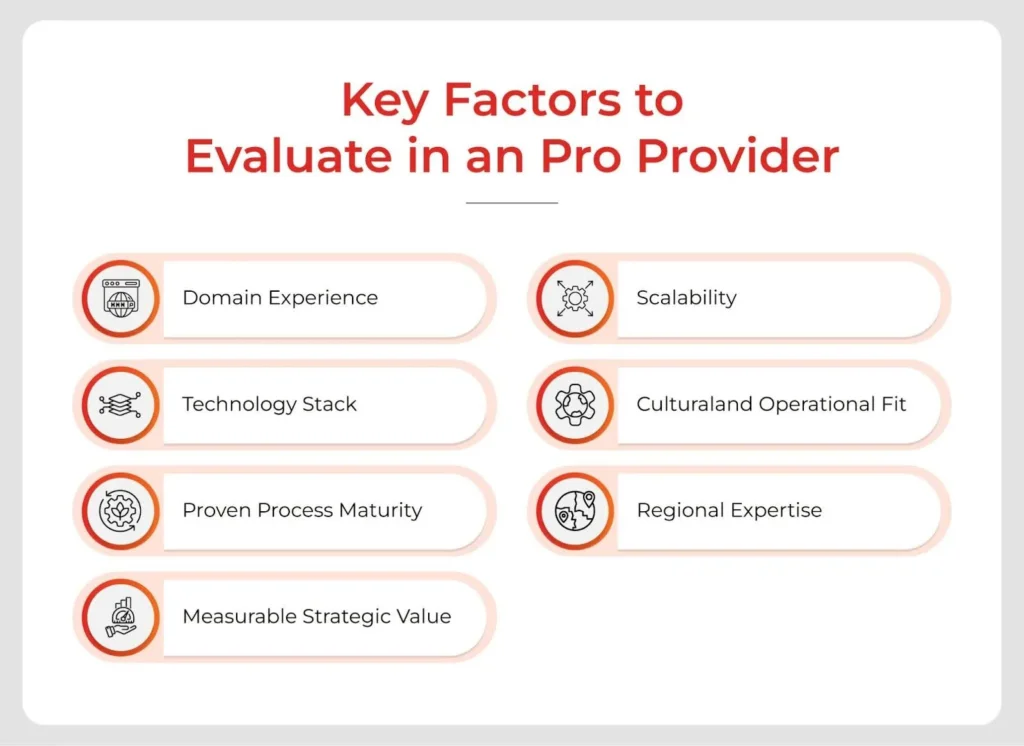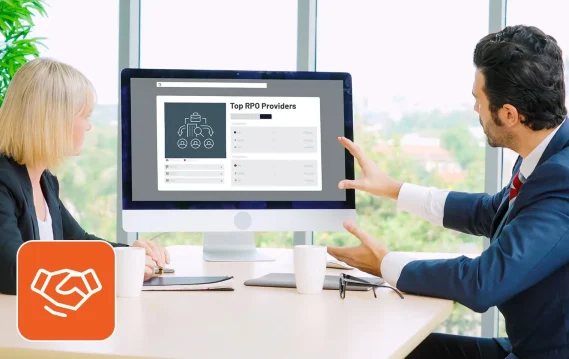An RPO provider (Recruitment Process Outsourcing provider) is a strategic partner that takes full or partial responsibility for your company’s hiring process. This includes everything from sourcing and screening to recruitment, and also technology and employer branding, all tailored to your business goals.
Choosing an RPO provider involves identifying who can partner with your business to shape smarter, scalable hiring outcomes. For talent acquisition leaders managing complex, evolving workforce demands, outsourced recruiting services have gone beyond being “nice-to-have.” They offer a strategic advantage when chosen wisely.
Yet not all RPO providers are equal. And choosing the wrong one? It’s a waste of budget and a risk to candidate experience, brand equity, and long-term talent outcomes.
Let’s walk through what truly matters when evaluating an RPO partner, beyond surface-level claims and polished pitch decks.
What Is an RPO Provider (And What It Isn’t)
At its core, an RPO provider (Recruitment Process Outsourcing provider) is a firm that takes ownership of all or part of your recruitment function. This includes strategy, sourcing, screening, employer branding, technology, and sometimes even onboarding. While traditional staffing agencies are primarily focused on candidate searching, matching, and supplying resumes, RPOs embed themselves within your processes (and often your systems) to build recruitment capability from the inside out.
Think of staffing agencies as temp help, i.e., quick, tactical, and transactional. They jump in when the pressure’s on, but they don’t stay to solve the system.
An RPO provider, on the other hand, is like building a custom hiring engine that runs with you and for you. They rewire the way talent flows through your business, with structure, feedback loops, and scale baked in.
When RPO Makes Strategic Sense
While you may look at engaging an RPO provider as a way to offload volume, it’s more about optimizing value. Here are some use cases where the benefits of RPO can be loud and clear:
- Periods of fast hiring growth (e.g., entering new markets, launching new products)
- Need for scalable hiring solutions without expanding internal TA headcount
- Cost reduction goals while maintaining quality of hire
- Global expansion where local hiring expertise and compliance are critical
- Transformation of hiring models (e.g., shifting from reactive to proactive recruiting)
In short: if your business can’t afford hiring delays, poor candidate fit, or lack of data visibility, RPO is worth serious consideration.
Also read our detailed blog about how RPO works
Key Factors to Evaluate in an RPO Provider
So what separates a vendor from a true partner? Below are seven non-negotiables when evaluating a potential RPO provider:

1. Domain experience of the RPO provider in your industry
An RPO that understands your business model, talent market, and compliance needs doesn’t need a learning curve, because they start contributing from day one. For this to happen, you need to be sure of their experience in the industry you operate in. For instance, tech hiring in Bangalore is very different from healthcare staffing in Texas. Ask for case studies and references relevant to your industry or geography.
2. Scalability without chaos
Whether you’re hiring 20 or 2,000, your RPO provider must scale up (or down) without compromising quality. Do they have an agile bench of recruiters? Can they respond to seasonal surges or sudden hiring freezes? Scalable hiring solutions only work when the underlying infrastructure is stable and reliable.
3. Technology stack and integration capability
Don’t underestimate this. Apart from using great tech, the right RPO partner makes your existing stack work better. Look for:
- ATS and CRM experience
- Data-driven hiring dashboards
- AI-enabled sourcing and screening tools
- Integration with your existing HRIS or onboarding systems
A strong tech foundation is what makes hiring not just automated, but fast and truly strategic.
4. Cultural and operational fit
As SHRM highlights, trust and flexibility are key to making RPO work. The best RPO partnerships feel like an extension of your own TA team. That means:
- Alignment with your employer brand
- Flexibility to adapt to your processes
- Transparent collaboration rhythms
- Respect for your internal stakeholders and hiring managers
Cultural misfit is one of the biggest reasons RPO deals underperform. Don’t ignore it during selection.
5. Proven process maturity
Ask to see their actual recruitment workflows. Do they have documented SOPs, quality gates, SLAs, and escalation protocols? Or are they building things on the fly? Maturity in process is what separates scalable delivery from chaos during crunch times.
6. Regional expertise
Hiring compliance, talent expectations, and even response rates vary by geography. RPO services with regional expertise knows what it takes to drive success in your key markets, from job ad wording to salary benchmarks and interview etiquette.
7. Measurable Strategic Value
It’s not enough to say “we improved time-to-fill.” A top-tier RPO provider should deliver on KPIs that matter to your business:
- Quality of hire
- Diversity hiring impact
- Hiring manager satisfaction
- Offer-to-join ratio
- Candidate NPS
- Long-term retention
Ask them how they define success, and how they report it to clients.
A Practical Checklist for Comparing RPO Providers
Here’s a quick way to vet and compare providers beyond the sales pitch:
| Evaluation Area | What to Look For |
| Industry Expertise | Case studies, team backgrounds, success metrics in your vertical |
| Scalability | History of supporting rapid growth or downturns |
| Technology | Tools used, analytics dashboard demos, integration flexibility |
| Cultural Fit | Team interaction style, transparency in communications |
| Process Discipline | SLAs, recruiter training, workflow documentation |
| Client References | Specific, recent, and relevant feedback |
| Geographic Coverage | On-ground knowledge and hiring capabilities |
| Strategic Metrics | Reporting cadence and alignment to your KPIs |
Apart from sending an RFP and comparing pricing, interview your RPO partner like a VP-level hire, because that’s how strategic the relationship can become.
The Role of Testimonials and Case Studies
Do not treat real client testimonials like fluff, but filters. Look for:
- Clients in similar industries or hiring scenarios
- Evidence of long-term partnerships (2+ years)
- Specific metrics and improvements (e.g., “reduced cost-per-hire by 35%”)
Also useful? LinkedIn posts, awards, and leadership interviews as they reveal how visible and trusted the RPO provider is in the talent acquisition space.
When It Comes to Choosing the Right RPO Partner, Strategy Wins Over Checklists
The real ROI of an RPO provider is in how your hiring function evolves. When done right, an RPO partnership should elevate your TA team, enrich candidate experience, and unlock competitive hiring advantages you couldn’t achieve alone.
But none of that happens without intentional evaluation. Go beyond the basics. Look under the hood. Ask uncomfortable questions.
Choosing your RPO partner should be a strategic decision because how you choose will shape the quality of your workforce for years. Treat it like a procurement task, and you’ll get transactional results. Treat it like a talent strategy, and you’ll unlock long-term value.
Looking for the right RPO partner? Talk to the experts at SPECTRAFORCE to find a solution tailored to your hiring goals.
FAQs
Industry-specific technology plays a defining role in selecting an RPO partner because hiring is different for everyone. Tools built for your sector (say clinical credentialing platforms in healthcare or skills-based screeners in tech) bring precision and relevance. A generic tech stack might tick boxes, but it won’t deliver the depth or accuracy required in niche talent markets.
RPO is absolutely suitable for startups, especially those experiencing fast growth. While enterprises often rely on long-term, embedded RPO models, many providers now offer modular and flexible solutions, perfect for startups needing quick scale without locking into complex contracts. It’s more about stage and strategy than size.
To measure the long-term strategic value of an RPO provider, you need to look far beyond transactional metrics like time-to-fill or cost-per-hire. Instead, focus on retention rates, hiring manager satisfaction, candidate experience scores, and DEI outcomes. Most importantly, assess how your internal TA function evolves. Does it become stronger, more agile, and more data-driven with the RPO in place?
Client testimonials influence the decision-making process in RPO selection by offering a real-world lens into the provider’s delivery, but only if you go beyond the surface. A quote on a slide isn’t proof. Look for specifics: Did they scale under pressure? Did they improve quality of hire? Better yet, speak to the clients directly and ask what they’d do differently if starting over.
Regional expertise can significantly impact the success of an outsourcing partnership by minimizing compliance risks, speeding up hiring cycles, and tailoring outreach to local talent behavior. From job descriptions to negotiation styles, regional context is a competitive edge, especially in global or multilingual hiring environments.



